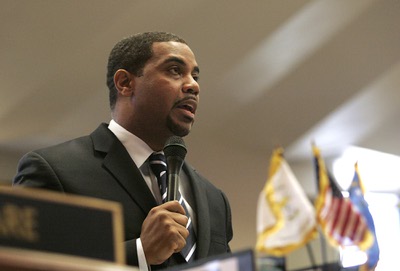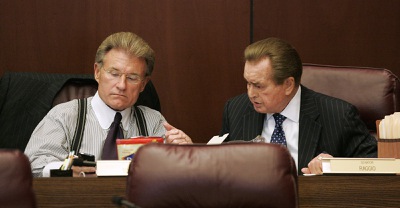Monday, March 1, 2010 | 2 a.m.
Sun Coverage
Reader poll
As the Nevada Legislature settled on a painful prescription of cuts and fees to solve the state’s budget crisis, lawmakers were not so subtly laying the foundation for the great tax debate of 2011, when the state will be staring into a much deeper abyss.
When lawmakers convene less than a year from now, they will face an estimated shortfall of $2 billion to $3 billion. Legislative leaders say the traditional bubble-gum-and-Scotch-tape fix that has seen the state through several rounds of budget cuts, including the special session and its $887 million shortfall, simply won’t work then. The Great Recession, they say, has brought into stark relief the flaws of Nevada’s tax structure, which is overly reliant on gaming revenue and sales tax.
Recognizing the higher stakes they will play for next year, legislators, lobbyists and the state’s most powerful interests used the brief session to posture and position themselves — drawing the battle lines for the 2011 fight.
Lawmakers took a tougher tone with the state’s business interests, asking them to step up and contribute more money to solve the state’s fiscal woes. Businesses, however, held their ground against new taxes or fees — and repeated a favored theme of the last two years and one that’s sure to be repeated in 2011: If the private sector is going to pay more, public employees must share the burden by accepting more modest pay and benefits.
Indeed, during the special session, business, led by the Chambers of Commerce, sought to maintain its momentum on weakening collective bargaining rights for local government employees, part of its effort to roll back public employee compensation.
State Senate Majority Leader Steven Horsford, D-Las Vegas — who called on businesses to come to the table and saw all but mining refuse — said that after cutting education and health and human services, Democrats and Republicans will champion fundamental tax reform in 2011.
“Whether it’s the budget crisis or the political dynamics, revenue reform is at the top of the agenda in 2011,” he said. “It is the agenda in 2011.”
Likewise, Senate Minority Leader Bill Raggio, R-Reno, said the lack of federal stimulus dollars and expiring taxes will force the Legislature to take up the revenue debate next year. “You can count quickly up to $3 billion,” he said. “You need a tax base that’s fair and equitable.”
To be sure, lawmakers always say the next session is the big one, where the lip service on taxes will turn into action. But in a sign that things could be different in 2011, legislators from both parties publicly lashed out at the state’s most powerful business interests here, even if, at the end of the day, they did nothing.
Horsford set the stage, calling on the gaming industry to pay $32 million in additional fees to cover the cost of the state agencies that regulate it. “Why aren’t corporations paying their fair share?” he asked in a dramatic floor speech. “The question is why should the state subsidize your cost of doing business?”
When gaming pushed back, saying it couldn’t afford the increases because of record losses in the last year, Horsford essentially mocked the industry.
“Look, $30 million is three $10 million high rollers,” he said. “To the average person who is really struggling to make basic decisions about how to keep their families together, the idea that the entire gaming industry can’t pay” rings hollow.
Sen. Mike Schneider, D-Las Vegas, apparently emboldened by term limits that will force him from office after the 2011 session, continued the whipping.
“We have kept the lowest gaming tax in the world here. We have changed laws. We have allowed them to make lots of money. ... And they have built markets around the world on Nevada dollars we let them take out.”
Schneider also chided the Chambers of Commerce and the retail, manufacturing and trucking industries for opposing higher fees to help close the state’s budget gap. He referred to them collectively as the “Group of No” and called the argument that more taxes would mean more businesses closing up shop and fleeing the state “a bunch of bull.”
He said he would bring them before the committee of commerce, tax and transportation in 2011 for a “Come to Jesus” meeting.
Sen. Randolph Townsend, R-Reno, long a friend of big business who sits on bank boards, also had tough talk for the chamber and financial crowd. He said contributing to the budget debate is about more than “showing up with a blue badge,” referring to the IDs worn by lobbyists.
“No, is not a plan,” said Townsend, who will be forced from office by term limits this year. “This is not about lecturing you, but it’s to set the record straight: You need to be at the table and explain how your industry can help us get to where we want this state to go.”
If business doesn’t offer ideas on how to solve the crisis “you are absolutely wasting our time,” Townsend said.
The fiery speeches — not heard in the Legislature in nearly a decade — shocked and angered business interests. Gaming mogul Steve Wynn called Horsford Saturday and, as one source put it, “reamed him out.”
Democrats in particular argue that businesses here have long benefited from low taxes and loose regulation. Nevada, they say, has effectively subsidized the operations of companies like Wal-Mart that pay higher taxes in surrounding states yet charge the same for products and services regardless of location. Hence the push for businesses to pay their “fair share.”
Mining was the exception. Boosted by record gold prices, the Nevada Mining Association agreed to a fee on mining claims to raise about $25 million. It was a relatively modest sum, given they are one of the few industries doing well and walked in with a giant target on their back. They stepped up to contribute, hoping to buy some goodwill in 2011.
Still, “no” worked. The only fee increase in the Legislature’s plan that wasn’t endorsed by the affected industry was a hike, from $50 to $200, on the charge for each home that banks foreclose on.
Gaming successfully joined the “group of no,” and Horsford failed to get the $32 million fee increase on gaming. Gaming and the Las Vegas Chamber of Commerce said they agreed to higher taxes last year and could not afford further increases.
The state’s business interests used the tough economy and their past contributions to argue against paying more and will likely do so next year. Gaming noted it has taken on an additional $1.1 billion in new taxes and fees since 2003. Regardless, they said they would be at the table in 2011 for the revenue reform debate — if the Legislature is willing to also examine the spending side of the ledger.
“The industry supports the vital quality of life needs of our fellow Nevadans, but we can no longer afford to subsidize other businesses and industries,” said Alan Feldman, a spokesman for MGM Mirage, in a statement. “Further, public employees cannot avoid the economic realities that the private sector has been struggling to manage.”
With casinos and the Chamber of Commerce taking up the call to reform collective bargaining, the debate is wrought with tension, since labor is one of the Democrats’ biggest allies.
Unions argue that changes in the state’s collective bargaining law aren’t needed because lawmakers tackled the issue in the 2009 session, through a number of measures that tilted the system toward management.
The changes took effect Jan. 1, and labor sent a team of lobbyists to Carson City last week to beat back any push for further concessions. Police, fire and county workers were all represented.
“What’s driving the issue here?” asked Rusty McAllister, president of the Professional Firefighters of Nevada. “You want more changes less than two months after the law took effect? It makes no sense.”
The Senate took on its powerful friends in labor — at least symbolically. It passed a nonbinding resolution encouraging public employee unions to negotiate in good faith with local governments on salaries and benefits to avoid layoffs.
For the critics who question his commitment to changing the status quo in 2011, Horsford had a message: “Stay encouraged. It’s real.”
A lobbyist, however, pointed to a sign in a historic drinking spot near the legislative building: “Free beer tomorrow.”



Join the Discussion:
Check this out for a full explanation of our conversion to the LiveFyre commenting system and instructions on how to sign up for an account.
Full comments policy